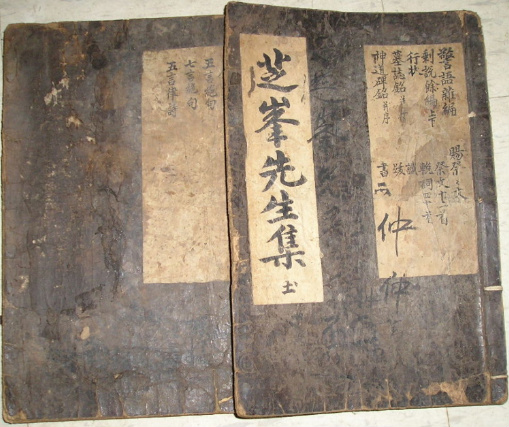(Translation) 芝峯集
Introduction
Yi Su Kwang 李睟光 (1563–1628), also know by his pen name Chibong 芝峯, was a Korean litteraty, a military official, and a diplomat of the Yi Dynasty of Choson. He was also an academic and an encyclopedist.
He was a member of the Korean winter solstice embassy to Ming China (1597-1598). At this occasion, he got in contact in Beijing with an embassy from Vietnam, and, in particular, with his Vietnamese counterpart, Phùng Khắc Khoan 馮克寬 (1528- 1613).
The present translation is a part of the content of their “brush-talks,” the written dialogue they held in classical Chinese, from Yi Su Kwang 李睟光 collected works, Chibongjip 芝峯集, where he recorded this dialogue and the several poems the envoys exchanged. As such, Yi’s collected works preserve one of the most detailed accounts of a contact between tribute envoys while on a mission in China. Besides the substance of this dialogue amounting to a virtual late sixteenth century intelligence report on Vietnam, the communication between these two envoys provides a greater understanding of the nature of knowledge and identity within the Chinese cultural sphere. This text is an important source to understand the ideological and identity position of Koreans and Vietnameses against China, especially after Ming fall and Qing rise. It's maybe one of the most important document about Vietnamese-Korean pre-modern relations.
Original Script
| Classical Chinese | English |
|---|---|
|
1- 問答
|
1- Question and answer.
|
Further Readings
- ↑ Giao-chỉ and Việt Thường (Jiaozhi) 交趾 was the name for various provinces, commanderies, prefectures, and counties in northern Vietnam from the era of the Hùng kings to the middle of the Third Chinese domination of Vietnam (c. 7th–10th centuries) and again during the Fourth Chinese domination (1407–1427).
- ↑ The higher rank in the imperial examination system.
- ↑ from the Chinese emperor.
- ↑ 都統使 - particular title bestowed by the Ming 明 on the Mạc 莫 rulers. When they came to power they submitted to the Ming, Vietnam’s status within the tribute system was reduced from that of a monarchy to a form which harkened back to the Han 漢 colonial designation "the pacified south" (Annam - 安南) . This political assignation from China to the Vietnam rulers take the name of 都統使. Which imposed a lower status to Vietnam on the Chinese diplomatic system, but recognized Vietnam was above a "barbarian" office, because administered by Confucian ideaology, not by tribal chiefs, such as were the Burmese, Siamese (Thaï) or Lao.
- ↑ Mạc Mậu Hợp 莫茂洽 (1560 - 1592) was the fifth and effectively last reigning emperor of the Mạc dynasty from 1562 to 1592.
- ↑ The Trần dynasty 陳朝 ruled Đại Việt from 1225 to 1400. The dynasty was founded when emperor Trần Thái Tông ascended to the throne after his uncle Trần Thủ Độ orchestrated the overthrow of the Lý dynasty. The final emperor of the dynasty was Thiếu Đế, who at the age of five years was forced to abdicate the throne in favor of his maternal grandfather, Hồ Quý Ly. The Trần dynasty defeated three Mongol invasions, most notably in the decisive Battle of Bạch Đằng River in 1288.
- ↑ Around 2500 km.
- ↑ Ma Fubo or Ma Yuan 馬援 (14 BC – 49 AD), courtesy name Wenyuan, also known by his official title Fubo Jiangjun 伏波将军 "General who Calms the Waves", was a Chinese military general and politician of the Eastern Han dynasty. He was a descendant of the Warring States period general Zhao She. His military and political achievements included helping Emperor Guangwu unite the empire and putting down rebellions of the Trung Sisters (in Jiaozhi, Vietnam).
- ↑ The location of this place is not really clear. But previous scholarship and the historical context very strongly suggest that they should be read as rendered here. This is because this is the district in which the rebellion against Han rule led by the Trung sisters originated and where it was defeated by Ma Yuan. It would, therefore, seem likely that the Chinese general placed the bronze pillars at this location. For further background on the Trung sisters, this rebellion and its place in early Vietnamese history, see Taylor, The Birth of Vietnam, pp. 37-41. For a much more detailed account of the placement and existence of the bronze pillars, as well as their significance in Vietnamese history, see Liam Kelley’s dissertation, pp. 1-14.

